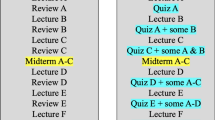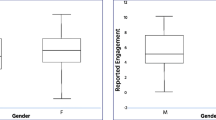Abstract
In the opening paper in this Special Edition I outlined the major issues that led to the establishment of project e-scape. The project was intended to develop systems and approaches that enabled learners to build real-time web-based portfolios of their performance (initially) in design & technology and additionally to build systems and approaches to facilitate the web-based assessment of those portfolios. The project was commissioned by the Qualifications and Curriculum Authority (QCA) with additional ‘buy-in’ from Awarding Bodies—who were seen by QCA as the leading beneficiaries of a successful project. The project was designed in three phases. I have outlined—in the Introduction to this Special Edition—the early exploratory work that we undertook within phase 1, the aim of which was to prove the viability of the concept. This was achieved, and QCA then commissioned phase 2 with a brief to build a working prototype system and run it through a national pilot-testing programme in 2006. Age 15 was the target age-group, aligning as closely as we could with the Awarding Body requirements for the General Certificate of Secondary Education (GCSE) that runs with age 16 learners. The successes of the phase 2 prototype—both as classroom activity and as reliable assessment—led QCA and Becta (the body responsible for funding ICT developments in schools) to commission phase 3 in which we explored the potential of the e-scape system for wider application. Specifically, we were required to demonstrate the transferability of the system to other curriculum areas beyond design & technology, and the scalability of the system if it were to be used for national assessment purposes, with hundreds of thousands of candidates. In this paper, I outline the approach that we adopted through the e-scape research; describe the major elements of the work both in terms of classroom/curriculum practice and in terms of new approaches to assessment; and analyse some of the key issues that arise from it.


Similar content being viewed by others
References
Kimbell, R. A. (2007a). Assessment of design and technology in the U.K.: International Approaches to Assessment chap 10, Assessment of technology education. In M. Hoepfl, & M. Lindstrom (Eds.), The 56th Yearbook of the Council for Technology Teacher Education (CTTE). McGraw Hill Glencoe. New York New York, Columbus Ohio, Chicago Illinois, Woodlands Hill California.
Kimbell, R. A. (2007b). E-assessment in project e-scape (pp 66–77) in the Special Edition on Assessment of Design & Technology Education: An International Journal Vol 12 No 2 Design & Technology Association Wellesbourne Warwickshire UK.
Kimbell, R. A. (2008a). Project e-scape: A web-based approach to design and technology learning and assessment ch 12, B. Choksi & C. Natarajan (Eds.), The episteme reviews: Research trends in science, technology and mathematics education (pp. 219–241). New Delhi: Macmillan India Ltd., ISBN 10:0230-63443-5 ISBN 13: 978-0230-63443-5.
Kimbell, R. A. (2008b). Design performance: DigitaL tools: Research processes. In H. Middleton (Ed.), Research methods for technology education. Rotterdam: Sense Publishers.
Kimbell, R. (2009). Performance portfolios: Problems, potentials and policy, chap 42. In A. Jones & M. de Vries (Eds.), International handbook on research and development in technology education. Rotterdam, NL: Sense Publishers.
Kimbell, R., Miller, S., Bain, J., Wright, R., Wheeler, T., & Stables, K. (2004). Assessing design innovation: A research and development project for the Department for Education & Skills (DfES) and the Qualifications and Curriculum Authority (QCA), Technology Education Research Unit [TERU], Goldsmiths University of London, London UK.
Kimbell, R. A. & Pollitt, A. (2008). Coursework assessment in high stakes examinations: authenticity, creativity, reliability. In Third international Rasch measurement conference. Perth: Western Australia: 22nd–24th Jan 2008.
Kimbell, R., Stables, K., Wheeler, A. D., Wozniak, A. V. & Kelly, A. V. (1991). The assessment of performance in design and technology, School Examinations and Assessment Council. London, UK HMSO D/010/B/91.
Kimbell, R. A., Wheeler, A., Miller, S., & Pollitt, A. (2007). E-scape portfolio assessment; phase 2 report technology Education Research Unit [TERU]. London, UK: Goldsmiths University of London.
Kimbell, R., Wheeler, T., Stables, K., Shepard, T., Pollitt, A., & Whitehouse, G. (2009). E-scape portfolio assessment: Phase 3 report Technology Education Research Unit [TERU]. London, UK: Goldsmiths University of London.
Riaz, M., & Razavipour, K. (2011). Agency of EFL teachers under the negative backwash effect of centralized tests. International Journal of Language Studies (IJLS), 5(2), 138–145.
Roth, W. M. (2005). Talking science: Language and learning in science classrooms. Lanham, MD: Rowan & Littlefield.
Secondary Examinations Council [SEC] (1986) Craft design & technology GCSE: A guide for teachers. Milton Keynes: Open University Press.
Stables, K. (2008). Embedding digital tools in creativity activity: Supporting and assessing the development of creativity. In J.-C. Hong & Y.-F. Pan (Eds.), International conference on creativity development (pp. 33–52). Taipei: National Taiwan Normal University.
Stables, K., & Kimbell, R. (2007). Evidence through the looking glass: Developing performance and assessing capability. In L. Taxén (Ed.), The 13th international conference on thinking, June 17–21, 2007. Norrköping, Sweden (Linköping Electronic Conference Proceedings, No. 21) Linköping University Electronic Press, Linköping, Sweden.
Author information
Authors and Affiliations
Corresponding author
Rights and permissions
About this article
Cite this article
Kimbell, R. Evolving project e-scape for national assessment. Int J Technol Des Educ 22, 135–155 (2012). https://doi.org/10.1007/s10798-011-9190-4
Published:
Issue Date:
DOI: https://doi.org/10.1007/s10798-011-9190-4




